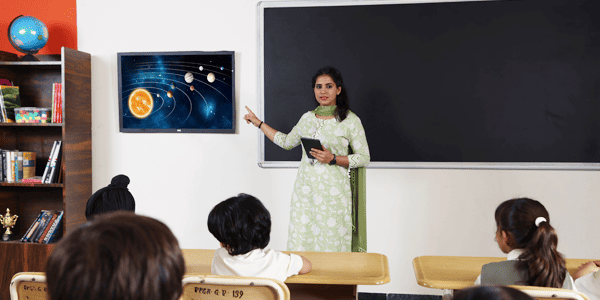Accelerate Learning with Primary Science Tuition Singapore for Young Minds
Accelerate Learning with Primary Science Tuition Singapore for Young Minds
Blog Article
Discover the Important Benefits of Recognizing Key Science for Young Students
The value of main science education and learning for young learners expands far beyond mere expertise procurement; it offers as a fundamental pillar in developing crucial abilities such as essential thinking, problem-solving, and creativity. Involving with clinical concepts with interactive and inquiry-based tasks not only cultivates curiosity yet likewise lays the foundation for durable, confident students.
Enhancing Essential Believing Abilities
Promoting crucial assuming skills in young learners is crucial for their cognitive development and future academic success. Critical reasoning allows children to examine information, examine evidence, and make notified choices, which are important abilities in today's information-rich society. By taking part in scientific query, young students can enhance these abilities as they check out principles through monitoring, reasoning, and testing.
In key science education, teachers can promote crucial reasoning by urging students to ask questions, develop theories, and conduct experiments. This hands-on strategy allows children to practice analytical and establish sensible reasoning skills. For instance, when trainees explore the buildings of products or the concepts of activity, they find out to analyze their searchings for seriously and attract verdicts based upon proof.
In addition, conversations and collective jobs can promote crucial thinking by giving possibilities for learners to verbalize their thoughts, challenge presumptions, and think about diverse viewpoints. By developing an encouraging atmosphere that values inquiry and representation, teachers can nurture critical assuming abilities that empower young learners to come to be independent thinkers and lifelong learners. Ultimately, boosting these skills lays a durable foundation for their future scholastic ventures and personal growth.
Fostering Inquisitiveness and Exploration

Main science education supplies a structured atmosphere where young students can explore different sensations via hands-on experiments and monitorings. By allowing them to engage with products and participate in inquiry-based discovering, instructors develop chances for youngsters to formulate hypotheses, check their concepts, and reason. Such experiences nurture a sense of marvel and exhilaration about science.

Structure Self-confidence in Issue Fixing
Building confidence in problem-solving is an important component of primary scientific research education and learning that empowers young learners to come close to difficulties with resilience and creativity - primary science tuition Singapore. When youngsters are motivated to involve with scientific ideas via hands-on activities and inquiry-based understanding, they establish necessary skills in important reasoning and analysis. This process not just enhances their understanding of clinical principles however likewise cultivates a sense of possession over their knowing
To build confidence, instructors directory ought to develop a supportive environment where errors are deemed opportunities for development instead of failures. This urges students to take dangers and explore numerous solutions to issues. By giving scaffolding and assistance, educators can help pupils navigate complicated jobs, gradually enhancing their freedom in problem-solving situations.
Moreover, collaborative learning experiences, such as team tasks or experiments, can better enhance trainees' confidence as they learn to articulate their ideas and pay attention to others' point of views. These interactions support social skills and reinforce the idea that analytic is usually a cumulative venture. Inevitably, growing self-confidence in problem-solving prepares young learners for future scholastic obstacles and furnishes them with the tools necessary for long-lasting knowing.
Motivating Imagination and Development
In the world of main science education, urging imagination and development is essential for growing a dynamic learning atmosphere. By fostering a society where young learners can check out ideas and experiment openly, teachers help trainees establish important assuming abilities and an interest for discovery. Imagination in science encourages youngsters to ask concerns, develop theories, and take part in hands-on activities that promote their imagination.
Incorporating flexible projects and inquiry-based understanding into the curriculum enables pupils to express their special perspectives and services. When entrusted with solving a problem relevant to their environment, students can brainstorm multiple methods, leading to innovative end results that display their originality. This not only strengthens their understanding of scientific ideas yet additionally infuses a see it here sense of ownership over their discovering process.
Moreover, innovative scientific research education and learning supports cooperation among peers, as students frequently share ideas and improve one another's insights - primary science tuition Singapore. This joint spirit promotes not only development but also important social skills. Hence, by focusing on creativity and innovation in key scientific research education and learning, we equip young learners to assume seriously, accept difficulties, and visualize opportunities, laying a strong structure for lifelong knowing and expedition
Getting Ready For Future Understanding Obstacles
Young learners' ability to browse future knowing challenges depends upon a solid foundation in main science education and learning. This foundational understanding outfits trainees with important believing abilities and an organized approach to analytic, vital for tackling complicated problems in an ever-evolving world. Main scientific research promotes inquiry-based understanding, motivating pupils to ask concerns, check out theories, and engage in hands-on experiments.
As they create these skills, students become skilled at analyzing data, identifying patterns, and drawing notified verdicts. Such proficiencies are essential not only in clinical fields yet also in mathematics, innovation, and engineering (STEM), where interdisciplinary understanding is progressively crucial.
Furthermore, key science education cultivates a sense of interest and durability in young students, allowing them to watch difficulties as opportunities for growth. As they come across and conquer challenges in their scientific explorations, they build self-confidence in their ability to adapt and introduce.
Ultimately, a solid structure in key scientific research Go Here not just prepares young students for scholastic pursuits but also outfits them with the devices essential for long-lasting discovering and versatility in a rapidly changing international landscape. By spending in main science education, we are buying the future possibility of our students.
Verdict
Recognizing main science is essential for young learners, as it cultivates important reasoning, interest, and imagination. Engaging with clinical ideas through hands-on experiments boosts analytical capabilities and builds durability. This foundational expertise not only furnishes students to assess information and recognize patterns yet also supports an inquiry-based mindset. Ultimately, the advantages of primary scientific research education prepare youngsters for future academic searches and impart lifelong knowing behaviors necessary for flourishing in an ever-evolving globe.
The significance of main science education for young students extends far past mere knowledge acquisition; it serves as a fundamental column in creating necessary skills such as crucial reasoning, analytical, and creative thinking. By creating a supportive environment that values inquiry and reflection, teachers can support essential assuming abilities that encourage young students to come to be independent thinkers and long-lasting learners. Thus, by prioritizing creativity and development in primary science education, we equip young learners to think critically, welcome obstacles, and picture opportunities, laying a solid structure for long-lasting knowing and exploration.
Young learners' capacity to browse future discovering difficulties pivots on a strong foundation in primary science education and learning.Recognizing main science is essential for young learners, as it fosters critical reasoning, interest, and creativity.
Report this page